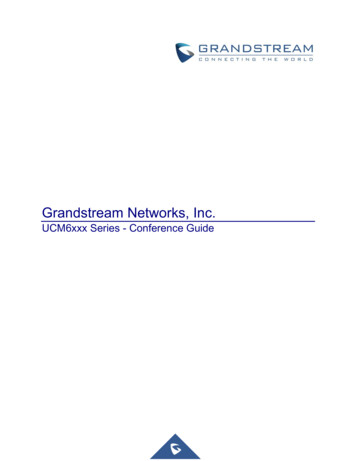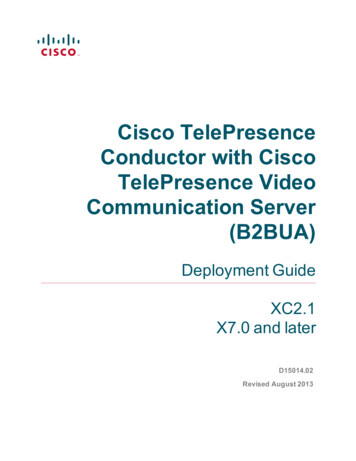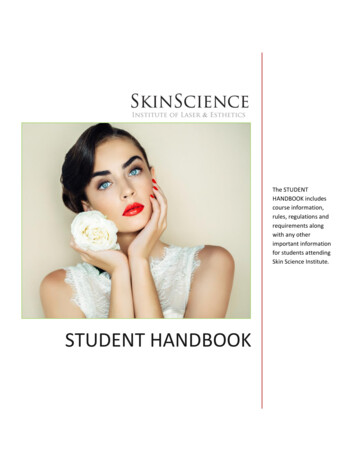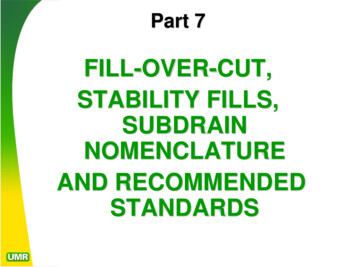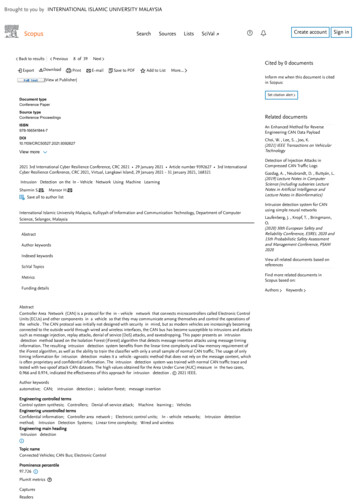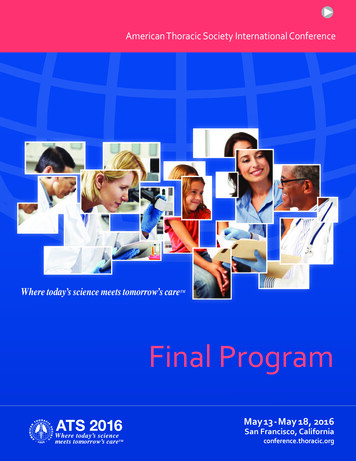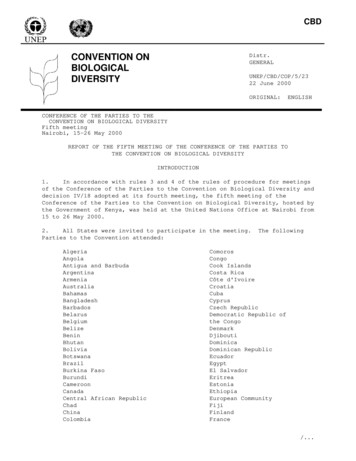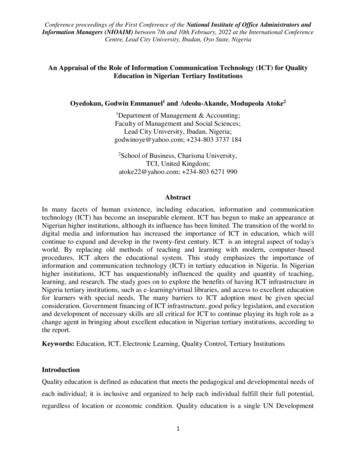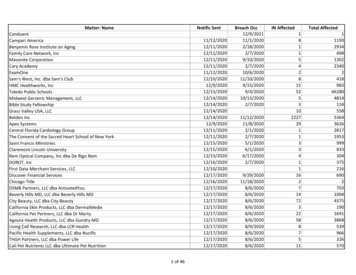
Transcription
ICBO ODLS 2020INTERNATIONAL CONFERENCE ONBIOMEDICAL ONTOLOGIESProceedingsof the11th International Conference onBiomedical Ontologies (ICBO)joint with the10th Workshop onOntologies and Data in Life Sciences (ODLS)and part of theBolzano Summer of Knowledge (BoSK 2020)Virtual conference hosted in Bolzano, ItalySeptember 17, 2020edited byJanna Hastings and Frank Loebe
ImprintPublishers and Editors:Janna Hastings1,2, Frank Loebe31Otto-von-Guericke University, Department of Computer Science, Magdeburg, GermanyUniversity College London, Department of Clinical, Educational and Health Psychology, UK3University of Leipzig, Computer Science Institute, Leipzig, Germany2Contact: Janna HastingsDepartment of Computer ScienceOtto-von-Guericke University Magdeburg, GermanyAddress: Universitätsplatz 2,39106 Magdeburg, GermanyEmail: hastings@ovgu.dePublished for:International Conference on Biomedical Ontologies (ICBO), part of the Bolzano Summer ofKnowledge (BoSK)Website:https://icbo2020.inf.unibz.it/Online publication:CEUR Workshop Proceedings (CEUR-WS.org),http://ceur-ws.orgPreferred citation:Janna Hastings, Frank Loebe (eds.): ICBO 2020 – International Conference on BiomedicalOntologies. Proceedings of the 11th International Conference on Biomedical Ontologies heldjointly with the 10th Ontologies and Data in the Life Sciences (ODLS), Bolzano, Italy, September 17th, 2020. CEUR-WS.org.It is recommended to include further the CEUR-WS.org volume number and the URL to thatvolume.Copyright 2020 for the individual papers by the papers' authors. Copyright 2021 for thevolume as a collection by its editors. This volume and its papers are published under theCreative Commons License Attribution 4.0 International (CC BY 4.0).ii
IntroductionAgainst the background of a globally unfolding pandemic, 2020 was a radically different yearfor researchers and academic conferences around the world. Like many conferences forced toadapt under the novel circumstances of restrictions on travel and congregation, ICBO ODLS2020 took place as a slimmed-down virtual event. Nevertheless, the virtual event was lively andwell attended. The virtual program, hosted by the Bolzano team of local organizers using theplatform Zoom, consisted of short pre-recorded presentations followed by virtual question andanswer sessions. In parallel, a virtual poster session was offered across the platforms WordPressand Discord.Each submission to ICBO ODLS 2020 was assessed by three reviewers. Contributions wereaccepted to four tracks: main research papers, tools and applications papers, early careerabstracts, and poster abstracts. Across these tracks, 35 submissions were received, of which 26were accepted. Among the topics of contributions to this were topics that were on everyone’sminds in these challenging times – ontologies for coronavirus description and data integrationin support of health research were prominent themes. Aside from this, other themes includedelectronic healthcare graphs, clinical documents, cross-references within and between bioontologies, molecular structures, and the ontology authoring process.This year was also the first year that ICBO and ODLS were held together. The ICBO series ofconferences began in Buffalo, USA in 2009, and is held annually in locations that alternatebetween the US and Europe. The ODLS workshop started with a workshop on Ontologies inBiomedicine and Life Sciences (OBML) in 2009. In 2013, integration with the formerlyindependent workshop on Data in Life Sciences led to the renaming to Ontologies and Data inLife Sciences (ODLS). Since then, ODLS workshops were held annually, except for in 2015and 2018, and mostly as independent events. Three times they were organized as a part of otherevents, namely of INFORMATIK 2013 in Koblenz, Germany, as well as of the Joint OntologyWorkshops (JOWO) in Bolzano, Italy, in 2017 and in Graz, Austria, in 2019. The BML/Workshops/ provides further information onthe workshop series.Acknowledgements and SponsorshipThe organizers thank everyone involved in making ICBO ODLS 2020 happen: the team of localorganizers in Bolzano, the keynote speakers, the authors of contributions, the ProgramCommittee members, those who contributed to the organization behind the scenes, as well asthose participating in the sessions, with or without their own presentation. Moreover, weappreciate the acknowledgement of the conference by the International Association for Ontologyand its Applications (IAOA) as an IAOA Supported Event and we are grateful for the servicesprovided by EasyChair and the free services provided by CEUR-WS.org.Last but not least, we acknowledge the generous hosting of the virtual event by the FreeUniversity of Bozen-Bolzano, Italy.iii
OrganizersJanna HastingsFrank LoebeAdrien BartonRobert HoehndorfPhillip LordJames OvertonRandi VitaJennifer WarrenderOtto-von-Guericke University Magdeburg, Germany &University College London, UKUniversity of Leipzig, GermanyCNRS-IRIT, France & Sherbrooke University, CanadaKing Abdullah University of Science and Technology,Saudi ArabiaNewcastle University, UKKnocean, inc., CanadaLa Jolla Institute for Immunology, USANewcastle University, UKLocal OrganizersOliver KutzGuendalina RighettiNicolas TroquardFree University of Bozen-Bolzano, ItalyFree University of Bozen-Bolzano, ItalyFree University of Bozen-Bolzano, ItalyKeynote SpeakersSusan MichieUniversity College London, UKProgram CommitteeSivaram ArabandiChristopher BakerJonathan BonaMelanie CourtotAlexander D. DiehlWilliam DuncanJesualdo Tomás FernándezBreisYongqun HeHeinrich HerreWilliam HoganRebecca C. JacksonLudger JansenMark JensenJames MaloneBjoern PetersPaul SchofieldLynn SchrimlRobert StevensChris StoeckertDagmar WaltemathYue ZhangJie ZhengIntelligent Medical Objects, USAUniversity of New Brunswick, CanadaUniversity of Arkansas, USAEMBL-EBI, UKUniversity at Buffalo, USALawrence Berkeley National Laboratory, USAUniversity of Murcia, SpainUniversity of Michigan, USAUniversity of Leipzig, GermanyUniversity of Florida, USAKnocean, inc., CanadaRuhr University Bochum & University of Rostock, GermanyUniversity at Buffalo, USASciBite, UKLa Jolla Institute for Immunology, USAUniversity of Cambridge, UKUniversity of Maryland, USAUniversity of Manchester, UKUniversity of Pennsylvania, USAUniversity of Greifswald, GermanyOregon State University, USAUniversity of Pennsylvania, USAiv
Keynote AbstractOntologies for Behavioural Science: The Human Behaviour-Change ProjectSusan MichieBehaviour change interventions (BCI), their contexts and evaluation methods areheterogeneous, making it difficult to synthesise evidence and make recommendations for realworld policy and practice. The Human Behaviour-Change Project (HBCP) is creating anonline ‘Knowledge System’ that uses Artificial Intelligence, in particular Natural LanguageProcessing and Machine Learning, to extract information from intervention evaluation reportsto answer key questions about the evidence. The Knowledge System will continually searchpublication databases to find behaviour change intervention evaluation reports, extract andsynthesise the findings, provide up-to-date answers to questions, and draw inferences aboutbehaviour change. Practitioners, policy makers and researchers will be able to query thesystem to obtain answers to variants of the key question: ‘What intervention(s) work,compared with what, how well, with what exposure, with what behaviours, for how long, forwhom, in what settings and why?’Ontologies are one of the means for addressing this challenge. They represent knowledgeformally as entities and relationships using a common language able to cross disciplinaryboundaries and topic domains. The HBCP are developing the Behaviour Change InterventionOntology (BCIO) to provide a systematic way to characterise BCIs, their contexts and theirevaluations. The upper level of the BCIO includes the BCI scenario and the BCI evaluationstudy. BCI scenario entities include the behaviour change intervention (content and delivery),outcome behaviour, mechanism of action, and its context, which includes population andsetting. These entities have corresponding entities relating to the planning and reporting ofinterventions and their evaluations. The BCIO provides a comprehensive and systematicframework for representing BCIs, their contexts and their evaluations.v
Program of ICBO ODLS 2020, September 17thSession 1: 16:00 – 16:55 Elizabeth Hobbs, Stephen Goralski, Ashley Mitchell, Andrew Simpson, Dorjan Leka,Emmanuel Kotey, Matt Sekira, James Munro, Suvarna Nadendla, Rebecca C. Jackson,Aitor Gonzalez-Agirre, Martin Krallinger, Michelle Giglio and Ivan Erill. Corpora asevolving entities: embedding corpora in biomedical ontologies.Yongqun He, Hong Yu, Edison Ong, Yang Wang, Yingtong Liu, Anthony Huffman,Hsin-Hui Huang, John Beverley, Asiyah Yu Lin, William D. Duncan, Jiangan Xie, JungHur, Xiaolin Yang, Luonan Chen, Gilbert S. Omenn, Barry Smith, Brian Athey andSivaram Arabandi. CIDO: The Community-Based Coronavirus Infectious DiseaseOntology.Amir Laadhar, Elcio Abrahão and Clement Jonquet. Investigating One Million XRefs inThirty Ontologies from the OBO World.Jana Vataščinová, Viet Bach Nguyen, Vojtěch Svátek and Ondřej Zamazal. Best-PracticePatterns for Biomedical Ontologies: Moving Under the Meta-Modeling Hood.Session 2: 17:00 – 17:55 Asiyah Lin, Stephan Gebel, Qingliang Li, Sumit Madan, Johannes Darms, Evan Bolton,Barry Smith, Martin Hofmann-Apitius, Yongqun He and Alpha Kodamullil. CTO: ACommunity-Based Clinical Trial Ontology and its Applications in PubChemRDFand SCAIViewAdrien Barton, Fumiaki Toyoshima and Jean-Francois Ethier. Clinical documents andtheir parts.Paul Fabry, Adrien Barton and Jean-François Ethier. QUESTO – An ontology forquestionnaire.Paul Fabry, Adrien Barton and Jean-Francois Ethier. An ontological representation ofsex and gender information.Session 3: 18:00 – 18:55 KEYNOTE: Susan Michie. Ontologies for Behavioural Science: The HumanBehaviour-Change Project.Rolf Grütter and C. Maria Keet. Towards a Framework for Meaning Negotiation andConflict Resolution in Ontology Authoring.Session 4: 19:05 – 20:00 Jona Thai and Michael Gruninger. A BioSequence Ontology from MolecularStructure.Georgeta Bordea, Jean Noel Nikiema, Romain Griffier, Thierry Hamon and FleurMougin. FIDEO: Food Interactions with Drugs Evidence Ontology.Pierre Lemordant, Bernard Gibaud, Cyril Garde, Sébastien Delarche, Didier Goudet andMarc Cuggia. Ontology-based classification of radiological procedures for consistentsharing in Clinical Data Warehouses.vi
Table of ContentsResearch Track Clinical Documents and Their PartsA.1-11Adrien Barton, Fumiaki Toyoshima, Jean-François EthierQUESTO – An Ontology for QuestionnairesB.1-12Paul Fabry, Adrien Barton, Jean-François EthierScaling and Querying a Semantically Rich, Electronic Healthcare Graph C.1-11Hayden Freedman, Mark A. Miller, Heather Williams, Christian J. Stoeckert Jr.Towards a Framework for Meaning Negotiation and Conflict Resolution D.1-12in Ontology AuthoringRolf Grütter, C. Maria KeetCIDO: The Community-Based Coronavirus Infectious Disease Ontology E.1-10Yongqun He, Hong Yu, Edison Ong, Yang Wang, Yingtong Liu, Anthony Huffman,Hsin-hui Huang, John Beverley, Asiyah Yu Lin, William D. Duncan, SivaramArabandi, Jiangan Xie, Junguk Hur, Xiaolin Yang, Luonan Chen, Gilbert S. Omenn,Brian Athey, Barry SmithCorpora as Evolving Entities: Embedding Corpora in Biomedical Ontologies F.1-11Elizabeth T. Hobbs, Stephen M. Goralski, Ashley Mitchell, Andrew Simpson, DorjanLeka, Emmanuel Kotey, Matt Sekira, James B. Munro, Suvarna Nadendla, RebeccaJackson, Aitor Gonzalez-Agirre, Martin Krallinger, Michelle Giglio, Ivan ErillInvestigating One Million XRefs in Thirty Ontologies from the OBO World G.1-12Amir Laadhar, Elcio Abrahão, Clement JonquetCTO: A Community-Based Clinical Trial Ontology and Its Applications H.1-12in PubChemRDF and SCAIViewAsiyah Yu Lin, Stephan Gebel, Qingliang Leon Li, Sumit Madan, Johannes Darms,Evan Bolton, Barry Smith, Martin Hofmann-Apitius, Yongqun Oliver He, Alpha TomKodamullilA Robust, Self-Training Classifier for Medication Strings, withI.1-12Quantitative and Semantic Confidence MetricsMark A. Miller, Hayden Freedman, Christian J. Stoeckert Jr.A BioSequence Ontology from Molecular StructureJ.1-12Jona Thai, Michael GrüningerFoundations for a Realism-Based Ontology of Protein AggregatesK.1-10Lauren Wishnie, Alexander P. Cox, Alexander D. Diehl, Werner CeustersTools & Applications Track FIDEO: Food Interactions with Drugs Evidence OntologyL.1-10Georgeta Bordea, Jean Nöel Nikiema, Romain Griffier, Thierry Hamon, Fleur MouginThe ARK Platform: Enabling Risk Management ThroughM.1-10Semantic Web TechnologiesAdemar Crotti Jr., Maryam Basereh, Yalemisew Abgaz, Junli Liang, Natalia Duda,Nick McDonald, Rob BrennanOntology-Based Classification of Radiological Procedures for Consistent Sharingin Clinical Data WarehousesN.1-11Pierre Lemordant, Bernard Gibaud, Cyril Garde, Sébastien Delarche, Didier Goudet,Marc Cuggiavii
Early Career Symposium An Ontological Representation of Sex and Gender InformationPaul Fabry, Adrien Barton, Jean-François EthierOGG-CoV: Ontology Representation and Analysis of Genes andGenomes of CoronavirusesAnthony Huffman, Yongqun HeBest-Practice Patterns for Biomedical Ontologies: Moving Under theMeta-Modeling HoodJana Vataščinová, Viet Bach Nguyen, Vojtěch Svátek, Ondřej ZamazalO.1-5P.1-5Q.1-5Posters A Python Utility for Working with OBO Foundry TermsR.1-2Jonathan P. BonaA New Alignment Method Based on FoodOn as Pivot Ontology toS.1-2Manage Incompleteness in Nutritional Legacy Data SourcesPatrice Buche, Cufi Julien, Stéphane Dervaux, Juliette Dibie, Liliana Ibanescu, AlrickOudot, Magalie WeberThe Plant Trait Ontology Links Wheat Traits for Crop Improvement and T.1-2GenomicsLaurel Cooper, Marie-Angélique Laporte, Justin Elser, Victoria Carollo Blake, TanerZ. Sen, Chris Mungall, Elizabeth Arnaud, Pankaj JaiswalWikidata WikiProject COVID-19: Modelling the Pandemic in Real Time U.1-2Tiago LubianaCurrent OBO Ontologies Are Not Sufficient to Annotate COVID-19V.1-2Related Cell TypesTiago LubianaAn Insight into Food Semantics: Review, Analysis, and Lessons LearntW.1-2over Food-Related StudiesGorjan Popovski, Gordana Ispirova, Eva Valenčič, Riste Stojanov, Tome Eftimov,Barbara Koroušić SeljakAn Ontological Model for the (Digital) PatientX.1-2Louis P. Ter Meer, Jan Hazelzet, Marleen de MulMondo Disease Ontology: Harmonizing Disease Concepts Across the World Y.1-2Nicole Vasilevsky, Shahim Essaid, Nico Matentzoglu, Nomi L. Harris, MelissaHaendel, Peter Robinson, Christopher J. MungallExpanding the eNanoMapper OntologyZ.1-2Laurent A. Winckers, Egon L. Willighagenviii
Susan Michie Behaviour change interventions (BCI), their contexts and evaluation methods are . Processing and Machine Learning, to extract information from intervention evaluation reports . Barry Smith, Brian Athey and Sivaram Arabandi. CIDO: The Community-Based Coronavirus Infectious Disease Ontology.

